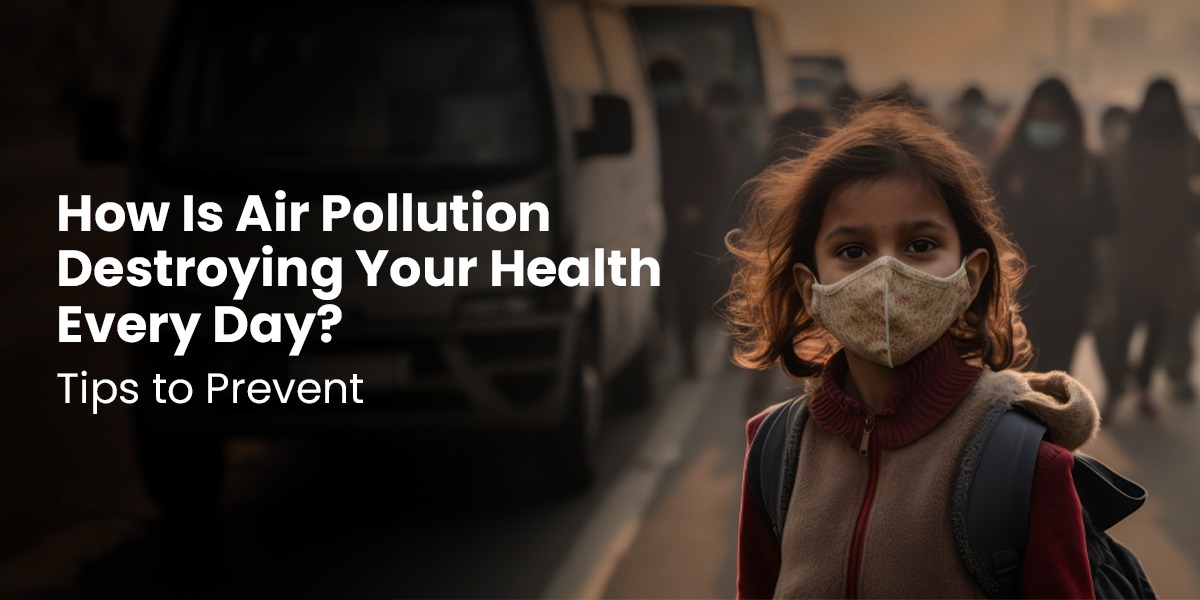How is Air Pollution Destroying Your Health Every Day? Tips to Prevent Yourself?

Unlike countries, regions and states, there are no specific boundaries for air pollution. If the outdoor air quality is too bad, it can trigger far-reaching health effects on you and your close ones. From your cars to your factories to your exhaust fumes, many things can trigger the release of harmful pollutants and deteriorate the quality of air you breathe in.
The long-term effects of these air pollutants can expose you to many diseases and hurt your body in various ways. The most common health hazards are allergies, asthma, and certain types of cancer.
Severe long-term exposures can be fatal and result in shortening your lifespan by months to several years. The World Health Organisation reports around 3 million deaths per year from outdoor air pollution.
How Does Poor Air Quality Make You Sick?
Long-term exposure to the deteriorated air outside can cause severe health problems, including:
- Chest pain
- Shortness of breath
- Premature death
- Heart attacks
- Asthma
- Bronchitis
- Wheezing
- Coughing
Poor outdoor air quality can also lead to emergency rooms or prolonged hospital stays. Your child can miss his school or other daily activities.
How to Know Whether the Outdoor Air Quality is Impacting You?
Here are some common signs and symptoms to know that the poor quality of air is impacting you:
- Running nose
- Troubled breathing
- Burning eyes
- Excessive phlegm
- Irritation in your lungs and throat
- Worsened conditions of your heart and lungs
Smog released from air pollution, smoke, or wildfires may even impact your vision by creating a hazy one. This might put you at a grave driving risk and increase your chances of suffering from an accident.
Keep your lungs safe from conditions caused by air pollution by consulting the best pulmonologist in Kanpur.
How is the Air Quality measured?
AQI, or the air quality index, is the indicator used to measure the levels of air pollution in your vicinity. The AQI scale varies between 0 to 500. The higher the area scores on this scale, the poorer the quality of air there. The government refers to this index to make the public aware of the air they breathe in. The Central Pollution Control Board (CPCB) identified 8 significant pollutants responsible for causing air pollution – particulate matter, carbon monoxide, ozone, sulphur dioxide, nitrogen dioxide, ammonia, and lead. These pollutants are detected by the air quality sensors placed in your zones.
Causes of Air Pollution
There are several underlying causes of air pollution. Here are a few of them.
Electrical Utilities
Your electrical utilities, such as oil, natural gas, coal, and biomass, result in lowering the air quality that you breathe in.
Transportation
Your vehicles, such as motorbikes, trains, cars, and buses, release harmful pollutants into the air, thereby affecting the air quality.
Residential Sources
Residential sources are responsible for air pollution by burning fuels such as wood or coal. Mowing lawns also releases emissions into the air.
Commercial and Industrial
With excessive burning of coal and using heat and power, industries or manufacturing facilities can turn the surrounding air into a breathless environment.
Suggested Read: Respiratory Infection: Symptoms, Causes, Prevention and Treatment
Tips for Prevention for Air Pollution
Here are a few tips for the prevention for air pollution that you should be aware of –
- The government releases daily forecasts for air pollution. Check the one where you live. The colour-coded forecast helps you to understand which area has poor air quality.
- Avoid exercising outdoors and restrict your outdoor activities when the air quality of your zone drops down. Also, limit the time your child spends outside.
- Lower the use of energy at your home. Continuous use of electricity and other energy sources can trigger air pollution.
- Prefer walking or using a bike over short distances. Make the best use of public transport.
- Avoid burning your trash or wood leftovers. These are the key resources for adding pollutants to the air that you breathe in.
- Prefer electric lawn care equipment or hand-driven one over gasoline-based lawn care equipment.
- If the air quality drops below normal, you are likely to suffer from disasters soon. Prepare yourself for disasters.
- Make sure that your indoor air quality is good. You can use humidifiers to maintain a good quality of air inside your house.
- There are measures available or recommended to prevent air pollution. You should raise your voice by checking campaigns where you can actively participate and share your feedback.
Takeaway
Breathing in poor-quality air can be disturbing for your health. Long-term exposure to air pollution is closely related to diseases of the heart and lungs, several types of cancers, and other allied health issues. That is why it is quite crucial for you, as a responsible citizen and a family member, to keep a close eye on the air quality index and forecasts to protect yourself and your loved ones.

 Call-an-Ambulance
Call-an-Ambulance



